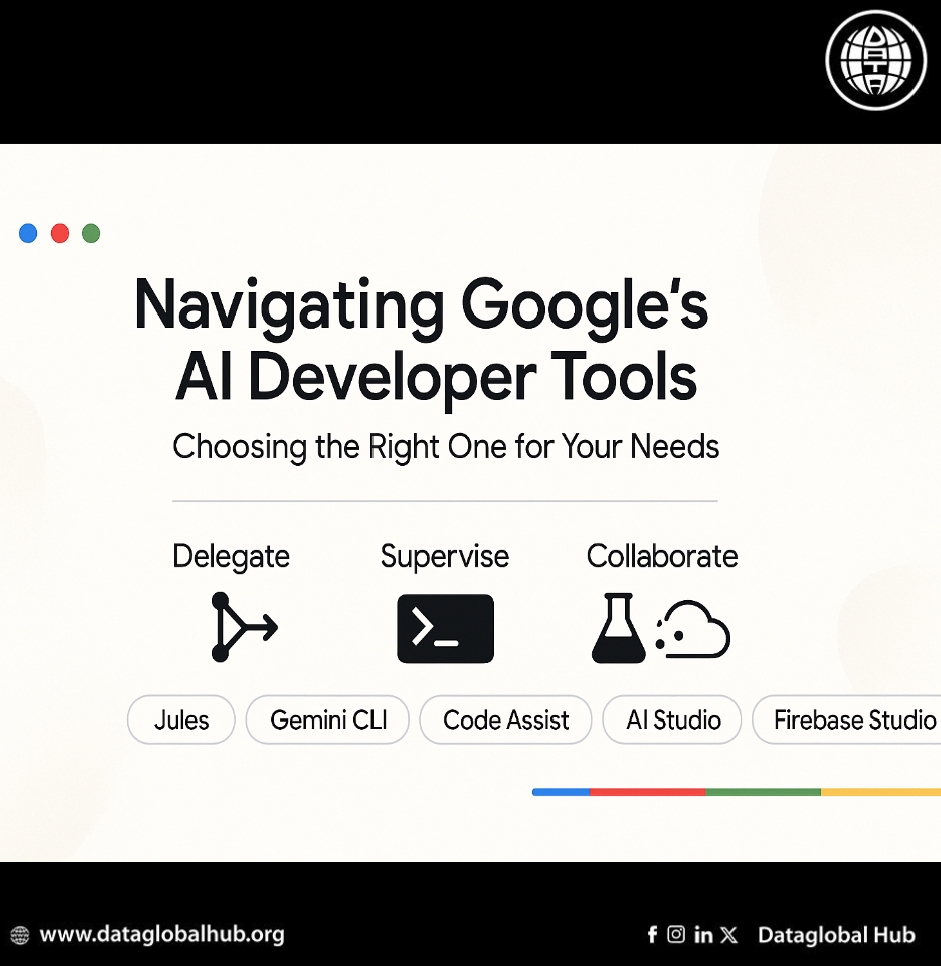
Navigating Google's AI Developer Tools: Choosing the Right One for Your Needs
Translate this article
In the ever-evolving landscape of AI and machine learning, Google's suite of developer tools stands out for its diversity, mirroring broader trends in technology where tools have proliferated to address specific workflows. Drawing from my extensive background covering AI advancements for DataGlobal Hub, I've observed how generative AI is reshaping software engineering, introducing new paradigms like delegated, supervised, and collaborative interactions. Recently, Google breakdown and clarifies when to leverage each of their offerings, from agentic services to IDE extensions. Here's a distilled guide based on that resource, highlighting the tools' strengths without overhyping their capabilities.
The Shift in Developer Tooling
Much like how smartphones consolidated gadgets like cameras, planners, and music players into one device, or how computing diversified from desktops to laptops, tablets, and smart TVs, AI tools are transforming development. Traditional setups UX design tools, IDEs, build systems, and scripting for deployment are giving way to AI-assisted options that enable delegation, supervision, and collaboration.
This diversification stems from AI's ability to assist in novel ways, such as code generation, testing, and modernization.
Key Google AI Tools and Their Ideal Use Cases
Based on the overview, here's a breakdown of each tool, focusing on their core features and scenarios:
Jules
Ideal for delegated, unattended batch work on GitHub-hosted source code. Provide explicit instructions for tasks like adding documentation, boosting test coverage, or targeted code modernizations. No need to manage infrastructure—iterate on a plan, send it off, and receive changes via a pull request. Available in a no-cost tier, plus paid Pro and Ultra options.
Gemini CLI
A versatile, open interface for interactive or delegated work with code and content. It's lightweight, requiring only a Node install, and offers extensibility through built-in tools and support for MCP (likely meaning multi-turn conversations or similar protocols). Integrated into other tools like Gemini Code Assist and Firebase Studio. For GitHub Actions variant: Use open-source actions for background tasks like issue triage or pull request reviews, triggered asynchronously or by users. Generous free limits for premium Gemini models, with enterprise support via Vertex AI and compatibility with Gemini Code Assist licenses.
Gemini Code Assist
A robust IDE extension for conversational or agentic codebase interactions. Plugs into Visual Studio Code and JetBrains IDEs, providing code completion, test generation, explanations, and generation. Extensible with custom commands, tools, and private codebase customization. Agent mode leverages the Gemini CLI for complex tasks. Free tier available, with per-user-per-month pricing for teams.
Firebase Studio
Suited for building professional-grade software in a browser-based, Google-managed environment, even if you're not a full-time developer. Start with templates for popular frameworks and languages; let Gemini generate code or edit directly in a customizable VM. Configure via Nix. No cost during preview, with expanded environments for Google Developer Program members.
Google AI Studio
Optimal for experimenting with Google's latest models, prompts, and lightweight web apps. Generate media, use the Live API for sessions, and prompt against Gemini and Gemma models. Features include tool usage, grounding with Google Search, and model comparisons. Provides API keys for programmatic calls. Generous free tier, plus paid options for higher limits, more features, and varied data handling.
Gemini App
Best for quick app prototyping, offering a straightforward entry point for initial ideas.
Cheatsheet for Quick Selection
From my vantage point in AI journalism, this proliferation echoes the excitement of past tech shifts, like the rise of cloud computing, but with an unprecedented pace. These tools complement each other, allowing mixes for varied tasks. Google emphasizes building top AI tools for creating superior apps, and they're open to feedback for improvements.
About the Author

Aremi Olu
Aremi Olu is an AI news correspondent from Nigeria.
Recent Articles
Subscribe to Newsletter
Enter your email address to register to our newsletter subscription!